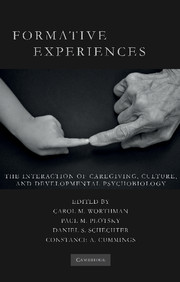Book contents
- Frontmatter
- Contents
- List of Figures
- List of Tables
- List of Contributors
- Foreword by Robert Sapolsky
- Preface
- List of Abbreviations
- Introduction
- SECTION ONE HISTORICAL, CROSS-CULTURAL, AND DEVELOPMENTAL SCIENCE PERSPECTIVES
- SECTION TWO HOW EXPERIENCE INTERACTS WITH BIOLOGICAL DEVELOPMENT
- SECTION THREE FORMATIVE RELATIONSHIPS WITHIN AND ACROSS GENERATIONS
- SECTION FOUR SOCIAL AND CULTURAL CONTEXTS OF CHILDHOOD DEVELOPMENT – NORMATIVE SETTINGS, PRACTICES, AND CONSEQUENCES
- SECTION FIVE FEAR, FUN, AND THE BOUNDARIES OF SOCIAL EXPERIENCE
- 15 Ethnographic Case Study: Anak PKI – A Longitudinal Case Study of the Effects of Social Ostracism, Political Violence, and Bullying on an Adolescent Javanese Boy
- Commentary
- Commentary
- 16 The Evolution of Social Play
- 17 Ethological Vignette: Social Stress as a Formative Experience – Neurobiology of Conditioned Defeat
- Commentary
- Commentary
- Commentary
- 18 The Basic Affective Circuits of Mammalian Brains: Implications for Healthy Human Development and the Cultural Landscapes of ADHD
- SECTION SIX PUBLIC HEALTH, EDUCATION, AND POLICY IMPLICATIONS
- Index
- References
Commentary
Published online by Cambridge University Press: 26 May 2010
- Frontmatter
- Contents
- List of Figures
- List of Tables
- List of Contributors
- Foreword by Robert Sapolsky
- Preface
- List of Abbreviations
- Introduction
- SECTION ONE HISTORICAL, CROSS-CULTURAL, AND DEVELOPMENTAL SCIENCE PERSPECTIVES
- SECTION TWO HOW EXPERIENCE INTERACTS WITH BIOLOGICAL DEVELOPMENT
- SECTION THREE FORMATIVE RELATIONSHIPS WITHIN AND ACROSS GENERATIONS
- SECTION FOUR SOCIAL AND CULTURAL CONTEXTS OF CHILDHOOD DEVELOPMENT – NORMATIVE SETTINGS, PRACTICES, AND CONSEQUENCES
- SECTION FIVE FEAR, FUN, AND THE BOUNDARIES OF SOCIAL EXPERIENCE
- 15 Ethnographic Case Study: Anak PKI – A Longitudinal Case Study of the Effects of Social Ostracism, Political Violence, and Bullying on an Adolescent Javanese Boy
- Commentary
- Commentary
- 16 The Evolution of Social Play
- 17 Ethological Vignette: Social Stress as a Formative Experience – Neurobiology of Conditioned Defeat
- Commentary
- Commentary
- Commentary
- 18 The Basic Affective Circuits of Mammalian Brains: Implications for Healthy Human Development and the Cultural Landscapes of ADHD
- SECTION SIX PUBLIC HEALTH, EDUCATION, AND POLICY IMPLICATIONS
- Index
- References
Summary
The sad story of Joko and his family fortunately has a hopeful end. After being treated as a social outcast in the community of his parents during childhood, as a young adult Joko seems to have found a way to cope with his traumatic past. The hopeful perspective of this case study is without any doubt from the early psychiatric intervention and care Joko has received during the most difficult episodes of his life. This treatment and care is based on the extensive practical experience of the staff and the application of best practices. However, as an empirically oriented biologist specializing in the neuroscience of social behavior, I wonder what the causal relationship might be between life events, treatment, and development. Obviously, causality cannot be derived from a case study such as the present one and is very hard to ascertain in humans. Therefore, I consider the case report as a rich source of inspiration for experimental work using animal models. The case study emphasizes our lack of knowledge and provides empirical support for evidence-based treatment. It strengthens my view that much more progress can be made when clinicians work together more closely with preclinical researchers using translational animal models. Ideally, both approaches should inspire and complement each other. Consequently, I will analyze the Lemelson case study to see where clinical studies need to be supported by preclinical experimental cause-effect studies. I would like to address four main issues: the stressor, the developmental period, the symptomatology, and the treatment.
- Type
- Chapter
- Information
- Formative ExperiencesThe Interaction of Caregiving, Culture, and Developmental Psychobiology, pp. 398 - 403Publisher: Cambridge University PressPrint publication year: 2010



